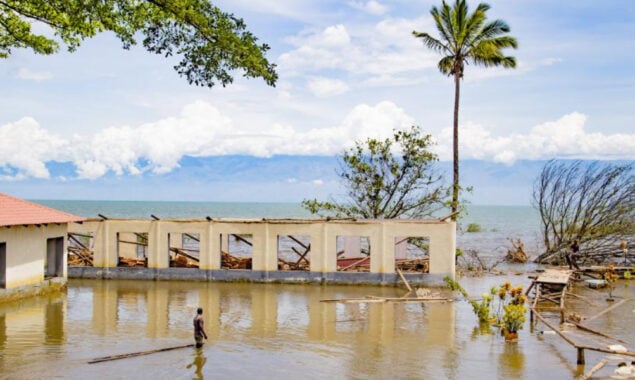NGOs sue gag order on gang statements in El Salvador
NGOs in El Salvador asked the judiciary on Tuesday to declare unconstitutional...

Amissa Irakoze never frightened Lake Tanganyika in her 40 years beside the sea. Her front entrance was frequently flooded, but they always retreated.
She couldn’t have predicted April 2020. Irakoze returned home from the fields to find her home underwater and her ten children disappeared.
“I cried, ‘My children, my children!'” the single mother said.
“The kids were washed away, but some nearby swimmers fished them out and returned them to me.” They all survived.
Water levels in Africa’s second-largest lake have risen to levels not seen in decades, pushed out by irregular and intense rains related to global warming.
Irakoze and her family live in a temporary settlement behind Gatumba.
Those evicted from their farm have little to do, their kids playing in the camp’s passageways.
“We used to farm and work to survive. But we’ve done nothing since arriving “Lea Nyabenda, a two-year-old mother of ten, agreed.
“The absence of shelter and food makes me worried. Sleeping here while we had a lovely spacious house, “said.
Gatumba, Burundi’s huge neighbour to the west, has developed substantially in recent decades.
Contrary to expectations, development in Gatumba has been rapid, even on a watery plain where it was forbidden.
One was Nyabenda’s former neighbourhood.
Her neighbourhood became a swamp as the lake grew. Some residences are still standing, although most are ruined and overgrown.
“This is where my house was,” Nyabenda remarked, pointing to a pile of soil and wood scraps where the bedrooms and living rooms used to be.
“I avoid it. The tension is growing.”
The neighbourhood is spooky.
Schools and businesses “have been damaged, as have crops and plantations,” said Geoffrey Kirenga, country director for Save the Children.
The lake displaced over 65% children. Most no longer attend school or any type of education and work to support their families.
“Children are fishing, which is risky. Unprotected, it exposes them to peril “Kirenga pointed to the muddy lake full of hippos and crocodiles.
– The threat is real: Save the Children expects the situation to deteriorate as the rainy season approaches in Burundi, the world’s poorest country by GDP per capita.
Hundreds of thousands of people have been displaced by political and social unrest in this tiny but densely populated nation situated between Tanzania, DR Congo, and Rwanda.
Burundians are still travelling in large numbers, but nature is now driving them.
Natural catastrophes accounted for approximately 85% of the country’s 113,000 IDPs, according to the IOM (IOM).
Burundi is one of the world’s most climate-vulnerable nations.
Prolonged equatorial rains are feeding the vast lake that runs along Burundi’s southwestern border.
But other things may be at play, according to former environment minister and Tanganyika conservationist Albert Mbonerane.
Generations have seen the lake ebb and flow.
But trash dumped into the lake’s rivers has risen sharply, and its only outlet — a river into Congo — may be blocked, preventing levels from falling.
He stated the lake’s height hasn’t changed since 2020.
“When I see all the garbage thrown into these rivers, the lake almost vomits,” he said.
Bujumbura, the country’s main city, likewise wraps around the lake.
Lots of land are flooded, and part of a four-lane road near the coast is submerged.
“Sometimes it feels like we’re just presenting a tale about the environment. But the truth is, “Mbonerane.
Catch all the International News, Breaking News Event and Latest News Updates on The BOL News
Download The BOL News App to get the Daily News Update & Follow us on Google News.